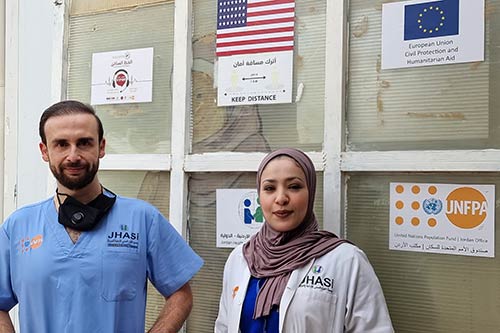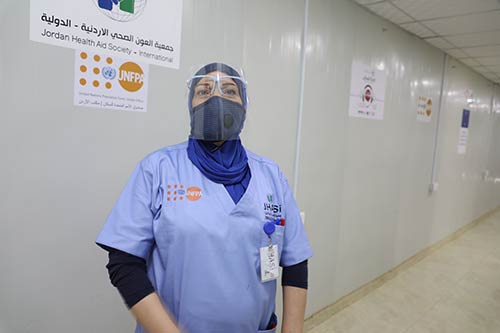News
In this refugee camp, midwives have delivered over 14,000 babies with zero maternal deaths
- 10 January 2022
News
ZAATARI CAMP, Jordan – "On my first day at work in the camp, I cried a lot. At that time, I had not worked with refugees before, and I had no idea about their conditions," Ammoun Kitabi, a 58-year-old midwife, told UNFPA, at the reproductive health clinic in Zaatari camp where she tends to Syrian refugees. "The reason I cried was because I knew that most of them had everything they needed in their country.”
Ms. Kitabi knows better than most.
Although she is Jordanian, she studied midwifery in Homs, Syria, where she also worked for five years before returning to her home country. The Syrian women she tended to in the 1980s enjoyed peace and quality care, she recalled. “Life might have been simple but it was a beautiful and stable one, until it was shaken when they were forced to flee to Jordan for safety from the shelling and war back home."
Today, the Syrian women she sees in her practice are not only in need of health services, they are in need of compassion.
"If you lose a simple thing, such as your mobile phone, you will get upset,” Ms. Kitabi said. “Imagine then, how did those who left everything behind and headed towards the unknown feel?”

Ms. Kitabi has delivered thousands of babies in her career, serving as the head of midwifery and neonatal intensive care and also as the head of nursing before arriving at the clinic in Zaatari camp, operated by UNFPA and the Jordan Health Aid Society International.
That clinic has performed more than 14,000 safe deliveries without a single maternal death.
As one of the clinic’s 40 health staff, Ms. Kitabi has overseen many of these services. In addition to safe deliveries, they also provide referrals to psychosocial care and case management for survivors of violence. A women’s and girls’ safe space is also available in the same building as the clinic.
“Ammoun is the backbone of this clinic,” said Dr. Ghada Doulat, director of the clinic. “She has become so indispensable that I cannot imagine the clinic without her. She is the one who gives us positive vibes to carry out our duties.”
The clinic has been supported by humanitarian funding from Canada, the United States of America and the European Civil Protection and Humanitarian Aid Operations, all major contributors to UNFPA’s humanitarian work.

Conditions in Zaatari have been challenging in recent weeks, as the weather turns cold and health workers continue to struggle under the weight of the COVID-19 pandemic.
When the pandemic first reached Jordan, Ms. Kitabi was unable to access the clinic due to movement restrictions.
When she finally obtained the necessary permits to get to work, she had to work twice as hard to meet the needs of her clients to compensate for the severe shortages in authorized staff.
Though the staff shortages have eased, Ms. Kitabi continues to work nearly around the clock. She spends six days a week at the clinic, with no thought of retiring any time soon. The pregnant women in the clinic are the family she was never able to have, she says.
"Maybe God did not intend for me to have children of my own, as I wasn’t able to conceive. However, I consider all the children as my own, because I was there for them when their eyes saw light for the first time,” she explained.
As she wrapped up the interview, she prepared to receive more clients for routine antenatal check ups and post-partum care. It was time to tend to her “daughters,” she said, beaming.